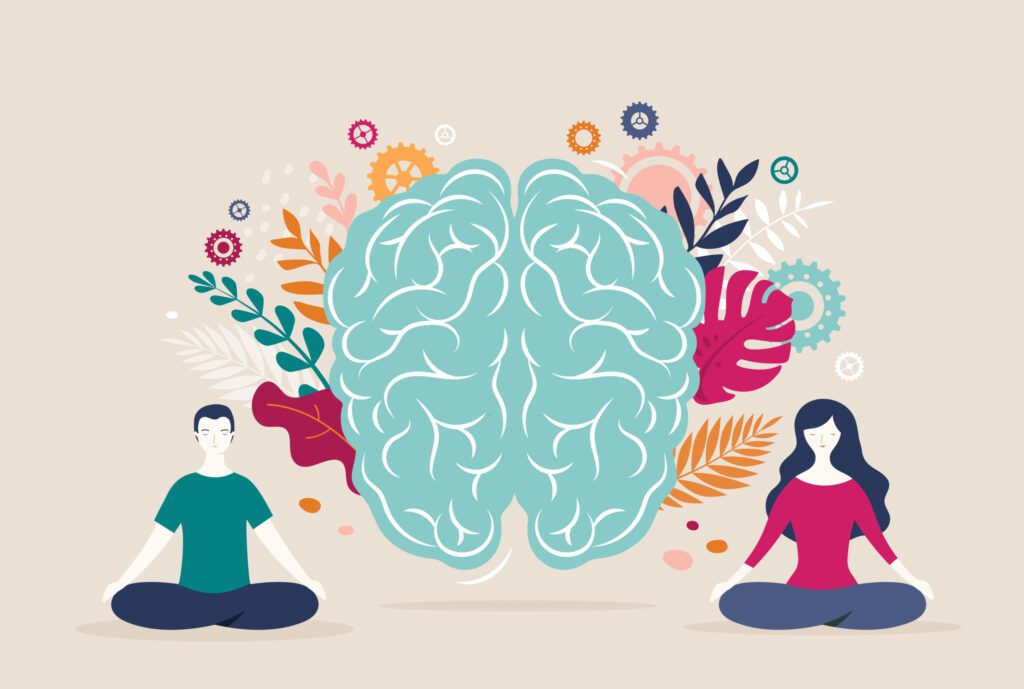Mental illnesses affect a person’s thinking, feeling, mood, or behavior. Depression and anxiety are the most common forms of mental illness. Still, your Primary Care Physician or a Therapist can help you determine what your mental illness is and provide different treatment options. Mental illnesses can be long-lasting, and many factors contribute to various mental illnesses. Below are some factors that contribute to mental health and mental illness and coping mechanisms that can help you on a daily basis. [Wondering what the difference is between mental health and mental illness? Click here!]

What Causes Mental Illness?
Factors that contribute to the risk of mental illness
- Trauma
- History of abuse (ex: child abuse, sexual assault, witnessing violence, and more)
- Experiences related to chronic medical conditions such as cancer or diabetes
- Biological factors
- Chemical imbalances in the brain
- Use of alcohol or drugs
- Having feelings of loneliness or isolation
Coping Mechanism for Mental Health
Coping mechanisms are strategies you can use when you are stressed, anxious, and/or have experienced trauma. The following are common ways to manage those difficult emotions.
- Practicing deep breathing
- Exercise
- Children – 60 minutes of moderate physical activity each day
- Adults – 150 minutes of moderate physical activity per week
- Read a book or articles you are interested in
- Go to therapy
- Cognitive Behavioral Therapy – used to explore relationships among a person’s thoughts, feelings and behaviors exploring relationships among a person’s thoughts, feelings and behaviors
- Dialectical Behavior Therapy (DBT) – Used to treat chronically suicidal individuals with borderline personality disorder (BPD)
- Get enough sleep – uninterrupted sleep
- Adults need 7 to 9 hours of sleep
- Children 6-12 years old need 9-12 hours
- Youth 13-18 need 8-10 hours of
- If you start to think negatively, renew your mind with positive self-talk and micro-affirmations
- “I am loved”
- “I am strong and courageous”
- “I am in charge of the way that I feel, and I choose joy, peace, and happiness”
- Eat a well-balanced meal
- Healthy foods rich in fruits, vegetables, whole grains, lean proteins, and low-fat or fat-free dairy
- Make art
- Painting
- Pottery
- Collage
- Make music
- Dance
- Meditate or practice Mindfullness & Gratitude
- Partaking in daily/routine religious or spiritual practice
- Clean
- Listen to Music!
- Talk to your friend and/or family member
- Play with your furry friends! Pets are shown to decrease stress levels in many people!
Coping mechanisms are not limited to the list above; they can be anything you enjoy doing as long as it is healthy and benefits your mental health.
Now you try! Spin the wheel to see what coping Mechanism you land on!
Sources
https://www.nami.org/About-Mental-Illness/Treatments/Psychotherapy
Types of therapy for anxiety and depression
https://www.takingcharge.csh.umn.edu/what-types-psychotherapy-are-helpful-anxiety-and-depression
https://www.apa.org/monitor/2011/12/exercise
Meditation
https://www.mayoclinic.org/tests-procedures/meditation/in-depth/meditation/art-20045858
Spirituality & Religion
https://www.nami.org/Blogs/NAMI-Blog/December-2016/The-Mental-Health-Benefits-of-Religion-Spiritual
Author: Efua Arthur
Need more? Check out these other great topics from the ¡Viva Bien! Blog:
